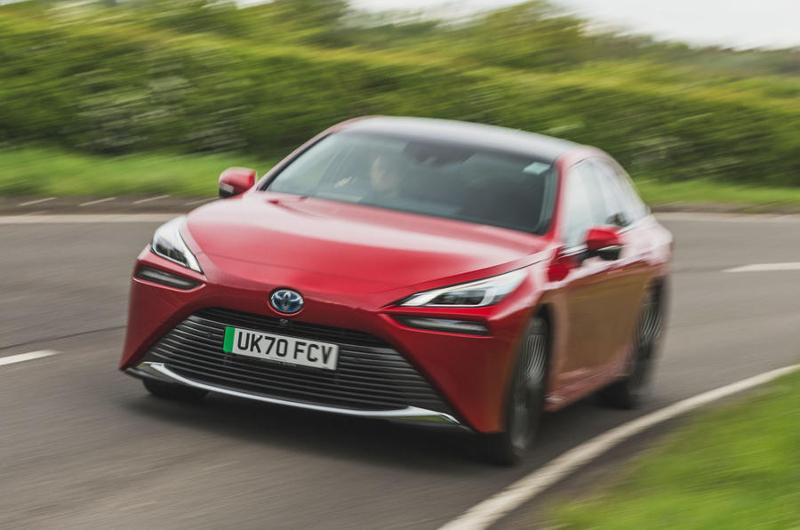In a groundbreaking move, Toyota is pushing the boundaries of electric vehicle technology. They have developed innovative battery solutions that will reshape the industry. One such breakthrough is their solid-state battery technology, set to launch in 2027 or 2028. This game-changing technology promises to improve power density, resulting in smaller, lighter, and more affordable batteries. Let's delve deeper into Toyota's remarkable advancements and their plans for the future of electric vehicles.
Toyota's Advancements in Battery Technology
Discover how Toyota is pushing the boundaries of battery technology.
Toyota is at the forefront of battery technology innovation, constantly striving to improve the performance and efficiency of electric vehicles. Their latest breakthrough is the development of solid-state batteries, which are set to revolutionize the industry. Solid-state batteries offer higher power density, longer range, and faster charging times compared to traditional lithium-ion batteries.
With their solid-state battery technology, Toyota aims to address the limitations of current electric vehicle batteries, such as limited range and long charging times. These advancements will make electric vehicles more practical and convenient for everyday use, paving the way for widespread adoption.
The Promise of Solid-State Batteries
Explore the potential benefits of Toyota's solid-state batteries.
Toyota's solid-state batteries offer several advantages over traditional lithium-ion batteries. One of the key benefits is improved power density, which means more energy can be stored in a smaller and lighter battery. This not only increases the range of electric vehicles but also reduces their weight, resulting in better overall performance.
Additionally, solid-state batteries have faster charging times, allowing drivers to spend less time waiting for their vehicles to charge. This convenience is crucial for the widespread adoption of electric vehicles, as it eliminates one of the main concerns of potential buyers.
Furthermore, solid-state batteries are safer and more durable than lithium-ion batteries. They are less prone to overheating and have a longer lifespan, making them a reliable and sustainable choice for electric vehicles.
The Road to Commercialization
Learn about Toyota's timeline for launching solid-state batteries.
Toyota plans to launch its solid-state battery technology in 2027 or 2028. However, the initial wave of solid-state batteries is expected to be expensive and limited to high-performance cars or vehicles with high-performance charging capabilities.
Despite the initial limitations, Toyota is committed to advancing solid-state battery technology and making it more accessible to a wider range of vehicles. They are collaborating with industry partners, such as oil giant Idemitsu, to further develop and refine the technology.
Additionally, Toyota will introduce its latest lithium-ion battery technology in 2026, which will be used in their next generation of electric vehicles. These advancements in battery technology will enhance the performance and efficiency of Toyota's electric vehicles, making them even more appealing to consumers.
Toyota's Modular Architecture for Electric Vehicles
Discover how Toyota's modular architecture enables the integration of batteries in various vehicle types.
To accommodate the diverse range of electric vehicles, Toyota has developed a highly modular architecture. This architecture allows for the downsizing of components such as e-axles, HVAC systems, and battery packs, making them slim and compact.
By minimizing the size of the battery packs to as slim as 100mm, Toyota can integrate them into a wide range of vehicle types, including lower saloons and sports cars. This flexibility in design ensures that electric vehicles can cater to different consumer preferences and needs.
Conclusion
In conclusion, Toyota's advancements in battery technology, particularly their solid-state batteries, are set to revolutionize the electric vehicle industry. These batteries offer higher power density, longer range, and faster charging times, making electric vehicles more practical and convenient for everyday use.
With their commitment to innovation and sustainability, Toyota is paving the way for a future where electric vehicles are the norm. The introduction of modular architecture further enhances the flexibility and integration of batteries into various vehicle types, catering to different consumer preferences.
As Toyota continues to refine and commercialize their battery technology, we can expect to see more affordable and accessible electric vehicles in the near future. The future of transportation is electric, and Toyota is leading the charge.
FQA
What are solid-state batteries?
Solid-state batteries are a type of battery technology that use solid electrolytes instead of liquid or gel electrolytes. They offer higher power density, longer range, and faster charging times compared to traditional lithium-ion batteries.
When will Toyota launch their solid-state batteries?
Toyota plans to launch their solid-state battery technology in 2027 or 2028. However, the initial wave of solid-state batteries is expected to be limited to high-performance cars or vehicles with high-performance charging capabilities.
What are the benefits of solid-state batteries?
Solid-state batteries offer several advantages over traditional lithium-ion batteries. They have higher power density, faster charging times, and are safer and more durable. These advancements make electric vehicles more practical and convenient for everyday use.
How does Toyota's modular architecture benefit electric vehicles?
Toyota's modular architecture allows for the downsizing of components and the integration of batteries into various vehicle types. This flexibility in design ensures that electric vehicles can cater to different consumer preferences and needs.

